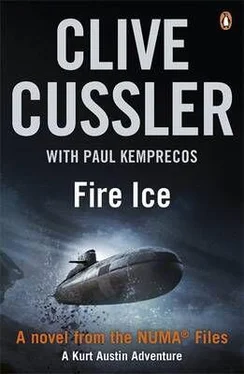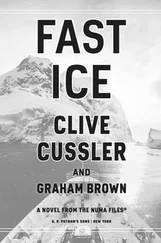He pushed the boat out to where the water was deeper and gave the cord a pull. The motor coughed, but didn't start. "This motor has an attitude," he said in apology. He rubbed his hands together, then adjusted the fuel mixture and tried again. This time, the motor sputtered and snarled before smoothing out. The Trouts got in the boat and Yuri gave it a push, jumped aboard and pointed the boat out to sea.
AUSTIN'S EYES TOOK a few seconds to adjust to the dimness. The pungent fragrance of incense evoked the image of an ancient Byzantine chapel in a monastery he had visited high on a hill at Mystra, overlooking the Greek city of Sparti. Gaslight flickered in brass lanterns of ornate gold and stained glass that were set into sconces in rough plaster walls covered with brilliantly painted icons. The vaulted ceiling was reinforced with thick wooden ribs. A high-backed chair faced an altar at the far end of the room.
They moved in for a closer look. The altar was draped with a dark purple cloth stitched in gold with the letter R. On top of the altar was a smoking incense burner. Set in the wall above the altar was a lamp whose yellow light illuminated a large black-and-white photograph in an ornate gold frame.
Seven people were pictured in the photograph. From the facial resemblance they shared, the two adults and five young people appeared to be posing for a family portrait. Standing on the left side was a bearded man wearing a military-style visored cap and a ceremonial military uniform trimmed with fancy piping. Medals adorned his chest.
A thin, pale-faced young boy in a sailor suit stood in front of the man. Next to the boy were three girls in their teens and another girl slightly younger, all gathered around a seated middle-aged woman. The children's features combined their father's wide forehead and the broad face of their mother. In the foreground was a low column like those used for museum display. Resting on top of it was a magnificent crown.
The crown was massive and obviously not designed to be worn for very long. It was heavily encrusted with rubies, diamonds and emeralds. Even in the black-and-white photograph, the gemstones crowding the surface glittered as if they were on fire. A two-headed gold eagle surmounted the globe.
"That little bauble must be worth something," Zavala said. He leaned closer and studied the somber faces. "They look so unhappy."
"They could have had a premonition of what awaited them," Austin said. He ran his hand over the embroidered altar cover. "R as in Romanov." He glanced around the funereal chamber. "This is a shrine to the memory of Tsar Nicholas II and his family. The boy in the picture would have been in line to wear that crown if he and his family hadn't been murdered."
Austin plunked into the chair facing the altar, and, as he leaned back, a deep chorus of male voices poured from hidden speakers. The religious chanting welled throughout the chamber and echoed off the walls. Austin shot out of the chair like a jack-in-the-box, his revolver at the ready. The haunting music stopped.
Zavala saw the look of alarm on his partner's face and stifled a laugh. "A bit jumpy, my friend?"
"Cute," Austin said. He pressed his hand against the back of the chair and the chanting resumed. It stopped when he removed his hand. "A pressure-activated switch turns on the tunes. It gives a whole new meaning to the term 'musical chair.' Care to try it?"
"No, thanks. My musical taste runs more to salsa." "Remind me to rig a Barcalounger up to my collection of progressive jazz." Austin glanced at the door. "We're done here. Even a rat wouldn't be dumb enough to be caught in a trap like this."
They left the somber confines of the Romanov shrine and returned to the staircase they had climbed from the submarine pen. They went up another level and found themselves in a barracks similar to the one below. Whereas the lower dormitory was neat, here blankets were bunched on the dirty mattresses as if thrown there in a hurry. Cigarette butts and plastic cups littered the floor. There was the stale smell of sweat and rotting food.
"Phew!" Zavala said.
Austin wrinkled his nose. "Look on the bright side; we won't need bloodhounds to pick up the trail."
They followed a wide corridor that slanted upward like the ramp in an underground parking garage. After a few minutes, fresh air blew against their faces, replacing the foul odor emanating from the barracks. Natural light coming from a bend in the passageway began to fill in the spaces between the puddles of illumination from overhead bulbs spaced in the ceiling.
The passageway ended in a steel door that had been left ajar. A short ramp led to the interior of what appeared to be a warehouse or garage. The concrete floor was stained with oil and spotted with the droppings of small animals. Austin picked an old, yellowed copy of Pravda out of a pile of rubbish. The beetle-browed face of Leonid Brezhnev glowered from the front page.
Austin tossed the newspaper aside and went over to a window. Not a shard of glass remained in the metal frame, giving him an unimpeded view of several nearby steel structures. The warehouse was part of the complex of abandoned buildings Austin had first seen from the air. The corrugated exteriors were streaked with rust, and the seams on the walls and roofs had buckled with age. Concrete walks linking the complex were overgrown with tall grass.
Zavala caught Austin's attention with a sharp whistle. He was looking out from the opposite side of the warehouse.
Working his way around the rubbish, Austin crossed over and peered through the window. The warehouse sat on a rise overlooking a large weed-grown field that was roughly rectangular in shape and depressed a few feet, like a giant soap dish. The rusty framework of a soccer goal jutted from the grass at one end. Austin guessed that the area had once been an athletic field used for R amp;R by visiting submarine crews.
Now, horsemen were strung out along the perimeter of the field on three sides. Only the side nearest the warehouse and the other buildings was open. Austin recognized the gray tunics and black pants worn by the gang of Cossacks that had shot him out of the sky. There were at least three times as many riders, now all facing into the field.
"You never told me this was a polo club," Zavala said, in a bad imitation of a British accent.
"I wanted to surprise you," Austin said, focusing on a frightened-looking group of people huddled in the center of the field. "We're in time for the last chukker. Follow me and I'll introduce you to the chaps I met the last time I was here."
Austin and Zavala slipped out of the warehouse, dropped to their hands and knees and wriggled snake-style until they came to the edge of the field where the grass thinned out. Austin pushed aside the grass for a better look as three horsemen broke away from the others, one from each side. With a series of bloodcurdling yells, the Cossacks galloped toward the huddled people, then broke off their charge at the last second and circled like Apaches attacking a wagon train. With each pass, they came closer. The horses kicked up fountains of dirt and the riders leaned out of their saddles and brought their whips down in slashing blows.
Austin quickly figured out the one-sided rules of the game. The Cossacks were trying to break the group apart so they could run them to ground individually. The field had been left unguarded on one side to tempt someone to make a break for freedom. But the strategy wasn't working. With each charge, their prey bunched closer together, like zebras being stalked by hungry lions.
Yelping loudly, the riders galloped back to the edge of the field and took their place in line again. Austin expected another attack, maybe with more riders. Instead, a lone horseman broke from the ranks and put his mount into a trot as if he were out for a Sunday ride.
Читать дальше












